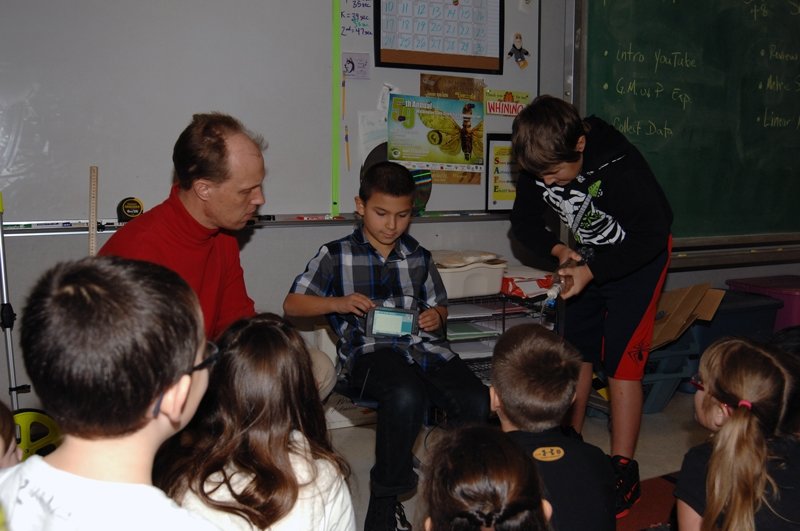 Vaughn teacher Matthew Mills, left, assists Rueben Velasquez, seated, and Gavin Adams with a recent pressure test assignment. Photo by Scott Turner, KP News
Vaughn teacher Matthew Mills, left, assists Rueben Velasquez, seated, and Gavin Adams with a recent pressure test assignment. Photo by Scott Turner, KP News
When you step into Matthew Mills’ class at Vaughn Elementary, one of the first things you notice is a zip line strung from one end of the room to the other.
Mills teaches science and engineering practices in the school’s STEM –– science, technology, math, engineering –– curriculum.
As Mills explains it, science is “mostly about answering a specific question. Engineering is more like –– we have this problem, like global warming on this planet –– and what can we do to mitigate that? So it’s answering questions versus building solutions.”
This year’s STEM curriculum is a four-part program that covers earth and space systems; physical science systems like energy, movement and so forth and life science “where we’ll talk about structures and behaviors of all kinds of critters –– plants and animals and comparative biology,” Mills said.
For the final segment, Mills plans to do a kind of engineering challenge.
For kindergartners that could be making straw rockets. First-graders might create origami frogs using different types of paper and folding techniques.
Third-graders may do an egg drop, “…to protect the egg from the top of the principal’s roof,” Mills said with a smile.
The engineering challenge for fourth-grade students will probably be to make rubber band-powered boats. “We have an 8-foot long gutter in the back and they have to get their boat from one end of the gutter to another.”
Each class is divided into teams, and each team comes up with their own design and the materials.
“I restrict them to certain variables –– like I provide the rubber bands, so it’s a baseline for everybody,” Mills said. “Or I’ll provide the straws for the kindergartners. But then if they want to add giant wings or whatever, that’s the creative process. They’re building and creating and changing.”
In their regular classrooms, fifth-graders are working on building two different kinds of rockets –– water rockets and solid fuel rockets.
That’s where the zip line comes in.
“There’s a target area and they have to bring their rider down and land it on the target area,” Mills explained.
“They can’t undershoot or overshoot and they can’t smack it into the wall. I set it up so I have an idea of where they’re going to need some guidance. But they don’t think about things like friction or mass or tension on the line. I only had one team last year that could do it.”
Even before the final project begins, though, Mills has other scientific and engineering concepts to cover.
Recently, the classes focused on pressure, using tools of measurement similar to what scientists use such as linear measurement, mass, effect of gravity on objects and how much they weigh, and volumetric measurements.
Mills received a grant to purchase some high-end lab equipment that includes seven actual pressure sensors. The students kept track of barometric pressure over several weeks, comparing it week to week.
“I want the kids to understand that the atmosphere is exerting pressure on us all the time. If I want to launch an air rocket, I’m pushing pressure into that rocket. It’s basically the idea of what pressure does –– pushing on a fluid or pushing on the air or on a gas, you exert pressure by force, and force and pressure,” he said.
At the same time, Mills is “trying to get them jazzed about getting their hands on stuff,” he added.
He’s also helping them understand the process. “When they’re doing pressure measurements, they’re taking notes in their notebooks. I also write something on the board and photograph it and upload it to the computer and then they compare their results with mine,” he said.
The kids seem to be enjoying the learning experiences.
Third-grader Zoe Stitt, 8, thinks it’s fun, “because we get to learn different tools. Like this bottle with a little tube that attaches to a tablet. We squeeze the bottle and the little tablet shows how much pressure we put on it.”
Nine-year-old Kristopher Davis likes that he’s learning “a lot about science and physical stuff. The teacher does stuff like pop a balloon. He’s a nice, fun, smart teacher. My most favorite things is that we get to see him do all that stuff.”
UNDERWRITTEN BY THE FUND FOR NONPROFIT NEWS (NEWSMATCH) AT THE MIAMI FOUNDATION, THE ANGEL GUILD, ADVERTISERS, DONORS AND PEOPLE WHO SUPPORT INDEPENDENT, NONPROFIT LOCAL NEWS